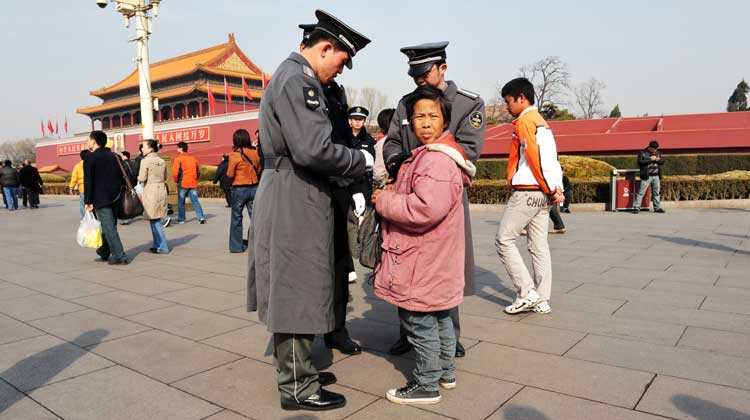
Larry Diamond, senior fellow at the Hoover Institution, recently painted a chilling picture of China’s surveillance state, detailing an evolving “social credit system” that rewards those loyal to the state and could punish those who aren’t.
In an interview on The John Batchelor Show Feb. 7, Diamond detailed how the Chinese state is taking advantage of massive leaps in technology to burrow even further into its citizens’ lives. It’s a herculean effort to track and catalog as much information on individuals as possible, and then ostensibly shake out the good and bad apples in the eyes of the state.
“The problem is just that technology is leaping forward and it’s becoming more and more multidimensional, ambitious, aggressive and, you know, just pervasive in the lives of Chinese people,” Diamond told Batchelor and co-host Gordon Chang.
The impetus for the conversation was an article by Diamond and Stanford researcher Anna Mitchell that appeared in The Atlantic entitled “China’s Surveillance State Should Scare Everyone.” In the piece, the authors note how a “citizen score” would follow individuals everywhere.
“A high score allows you access to faster internet service or a fast-tracked visa to Europe,” they wrote. “If you make political posts online without a permit, or question or contradict the government’s official narrative on current events, however, your score decreases.” Add to that private companies that work hand-in-hand with the government, sharing data from social media posts to online shopping habits.
It could be the pop culture equivalent to an episode of the Netflix series Black Mirror, a show that “explores a twisted, high-tech near-future where humanity’s greatest innovations and darkest instincts collide.” (See season 3, episode 1 “Nosedive.”)
While Batchelor quickly noted the Orwellian parallels in his opening, it’s not disagreeable to everyone.
“A number of Chinese are saying they like this social credit system, because it’ll enable them to keep, compete, and get a good social credit so that they’ll be able to demonstrate their loyalty to the Chinese state and rise up in the social hierarchy,” Diamond said.
But that’s not everyone, particularly those on society’s margins and suffering the many injustices of a predatory Communist state, Diamond added.
“A lot of what we hear and see as enthusiasm and loyalty is a very kind of sullen and wary and careful acceptance because of the cost of disagreeing,” he said. “But when you force people to be sullen and to kind of submerge their anger and resentment, you do risk … a social explosion.”
There’s another dynamic involved here as well, as many families still in China have money elsewhere. Diamond, crediting his colleague Minxin Pei from Claremont McKenna College, said the country could risk “the political equivalent of a bank run in which much of the elite just get on a plane and flee because they’ve already created a nest egg for themselves abroad.”
As for the ever-evolving surveillance, those advances keep coming—the convergence of remarkable technology and an ever-controlling Communist state. One of the latest advances, Diamond said, includes sunglasses worn by law enforcement that collect data in real time and send it back to internal security headquarters to sort out faces of the typical criminal or opponents to the regime.
“[T]hey can pounce on these people in real time,” he said. “It’s just another example of the way they are leaping forward in terms of surveillance technology in an utterly creepy way that, you know, might control crime.”
Listen to the entire segment at The John Batchelor Show.
© 2018 Homeland411
Click here to subscribe to the Homeland411 weekly newsletter.